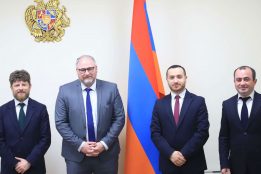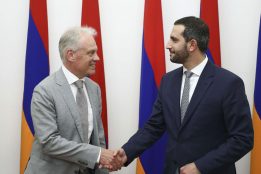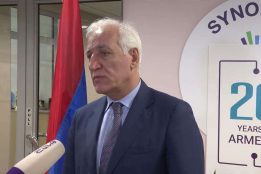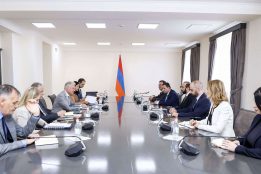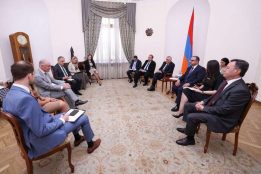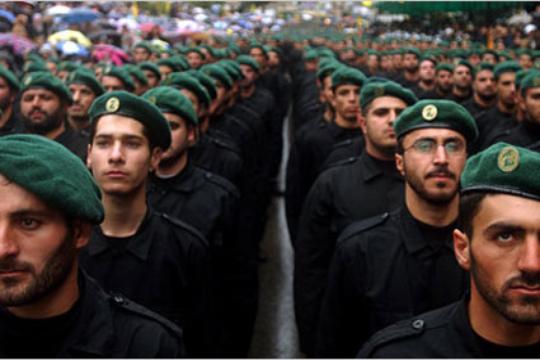
When Saad Hariri entered the Oval Office to meet U.S. President Barack Obama on Wednesday, he did so as the prime minister of Lebanon. Twenty minutes later, he was merely the head of a caretaker government forced to rush back to Beirut (with brief stops in Paris and Ankara) to attend to the umpteenth crisis in a country fraught with political and sectarian divisions.
In a symbolically well-timed smack, 11 Hezbollah opposition and allied ministers resigned from the national-unity government after a rocky 14 months. Lebanese President Michel Sleiman will hold consultations on Monday to name a new PM and form a new government. This may take time (Lebanese have taken umbrage of the fact that Iraqis beat their record at forming its government), and not a few Lebanese have already quipped that even a caretaker government would do a better job than the paralyzed and dysfunctional cabinet that just passed away. Some people will be tempted to dismiss this crisis as yet another time-consuming, nerve-wrecking Lebanese drama, but the succession of shock waves is bringing home the point that the two sides are now locked in a fight for their very existence.
In an interview in Al-Hayat last week, Hariri had alluded to the contours of a possible Saudi-Syrian brokered deal over the anticipated indictment of Hezbollah operatives by the Special Tribunal for Lebanon (STL), mandated with trying suspects in the assassination of the former Prime Minister Rafik Hariri and others. Instead, on Tuesday General Michel Aoun, the Syrian-foe-turned-Hezbollah-ally, announced that the talks had collapsed because of foreign pressure and Hariri’s inflexibility. The opposition ministers officially resigned to protest Hariri’s refusal to convene a cabinet session to force through the fictitious but increasingly potent issue of the false witnesses.
In the early days of the Hariri investigation (before the STL was even set up), a number of people accused Syria of involvement in Hariri’s assassination, but their testimonies appear to have been fabricated or are considered to be unreliable. However, since the indictments haven’t been issued, there is no evidence that the STL is relying on these witnesses to build its case. Politically, however, the issue is being used to complicate and discredit the work of the STL in Hezbollah’s relentless campaign to paint it as an American and Israeli creation.
This rapid political deterioration follows a frantic few days of diplomacy. Hariri had flown to New York for a round of talks with Saudi monarch King Abdullah, French President Nicolas Sarkozy, U.S. Secretary of State Hilary Clinton, and U.N. Secretary-General Ban Ki-moon before heading to Washington to meet with President Obama. Inevitably, accusations erupted that the United States had adopted a maximalist position and forced Hariri to walk back on the Syrian-Saudi deal, though it is as likely that Hariri — always uncomfortable with the formula but mindful of Saudi desires — went to the United States wanting to get the support of his foreign allies. After a series of setbacks and months of government paralysis, Hariri may well have decided to show some spine to his public and force Hezbollah to go for the nuclear option.
It helped that Hezbollah seemed to go for the kill. The envisaged deal always had the bitter taste of defeat for Hariri and the March 14 camp. In return for distancing himself and his government from the STL or altogether disavowing it, Hezbollah would have been expected to let him govern under a joint Syrian-Saudi umbrella. This, however, would have resuscitated the failed formula of the 1990s that gave Rafik Hariri control over economic and development policy (which pleased the Saudis) but substantively limited his authority on foreign and security policy (giving Syria and Iran a dominant role through Hezbollah). Worse, Hariri would have faced ire and dejection within his own community, to say nothing of charges by Sunni radicals that he had failed to protect his ilk. He would have also lost much of his national standing as the remnants of the March 14 coalition that backs him would have sunk in despair. The Shiite organization would however have kept its weapons, obtained the ministerial cover for its “resistance,” and gotten a clean slate from the son of the slain Sunni leader. This hardly would have been a winning formula for long-term Lebanese stability.
In reality, the failure of the Syrian-Saudi effort should come as a no surprise. At this point, the STL is an unstoppable, self-controlled train, even mandated to try indicted individuals in absentia should the Lebanese state fail to arrest them. No one, including the Saudis, would have been able to deliver on a promise to slow or impede on its proceedings. Syria, though publicly intent on placating the Saudis who facilitated its political return in Lebanon, is in no position to contain the political power of Hezbollah either, nor does it want to part with an ally that provides it with the kind of regional clout and role that intrinsic Syrian power alone cannot. The two countries could at best agree on rules of the game — maintaining an institutional guise to the crisis and containing violence –in the hope that their allies would abide by them. But Lebanese street politics can easily derail these intentions, and Syrian and Iranian mischief cannot be overlooked.
What now? The opposition-aligned Al-Akhbar newspaper ran the headline “The beginning of the unknown” yesterday. In reality, this episode is all too reminiscent of the 2006-2008 period which saw a similar ministerial walkout followed by months of demonstrations, sit-ins, and occasional violence. It culminated in the mini-Hezbollah coup of May 2008 and the Doha agreement that gave the opposition greater government representation for, as became amply clear yesterday, the sole purpose of derailing the STL in due time. That may well be the playbook for this new phase.
This time, however, the opposition enters the fight in a much stronger position, and the March 14 camp in a weaker one. For March 8, a deal would have made most sense and landed most benefits if it came before the indictments were issued. That won’t happen so it has little to lose and no longer has to worry about time. The defection of Druze chieftain Walid Jumblatt from March 14 has also strengthened it. Unsurprisingly, opposition voices have already mocked the foreign support that Hariri has gotten, a clear reference to the impotence of the United States and others during the May 2008 Hezbollah takeover of Beirut. So while the opposition will probably not shy from barking louder — already an opposition MP, Qassem Hashem, emphatically warned that “Lebanon is heading toward destruction”– it does not necessarily feel the need to bite.
Violence in the immediate future is therefore unlikely, largely because the clashes of May 2008 have amply demonstrated who owns the street. Presently, Hezbollah is proceeding smartly; the division of roles puts Aoun and other allies on the forefront of the political maneuvering, thus reducing Hezbollah’s visibility. Now that it has become evident that Hezbollah views the STL as an existential matter, everyone assumes its readiness to escalate as far as civil war to protect itself and its ethos of resistance.
In contrast, Hariri has considerably fewer instruments at his disposal. The polarization and his steadfastness may well rally followers and reassure allies. He may even find solace in the fact that come indictment time, there may well be no functioning or legitimate cabinet to cave to Hezbollah pressure and denounce the STL. But Hariri cannot escalate on his own terms. Western and Arab statements of support will do him little good in the face of intimidation; his coalition has weakened, and he won’t resort to violence.
Hariri should instead bank on the missteps of the opposition. A few March 8 figures have already alluded to the option of backing a pro-Syrian, pro-Hezbollah Sunni for prime minister, and Hezbollah can force a feeble Jumblatt into agreeing to this formula to garner enough votes. However, a government that excludes the most prominent Sunni and is primarily designed to obstruct the STL will have the scantest degree of legitimacy and will only inflame sectarian passions. Hariri will then have to maneuver deftly to contain them while sticking to the tribunal in the hope that the truth comes out — and that the Lebanese will not be too battered or divided to care.
/Foreign policy/

















